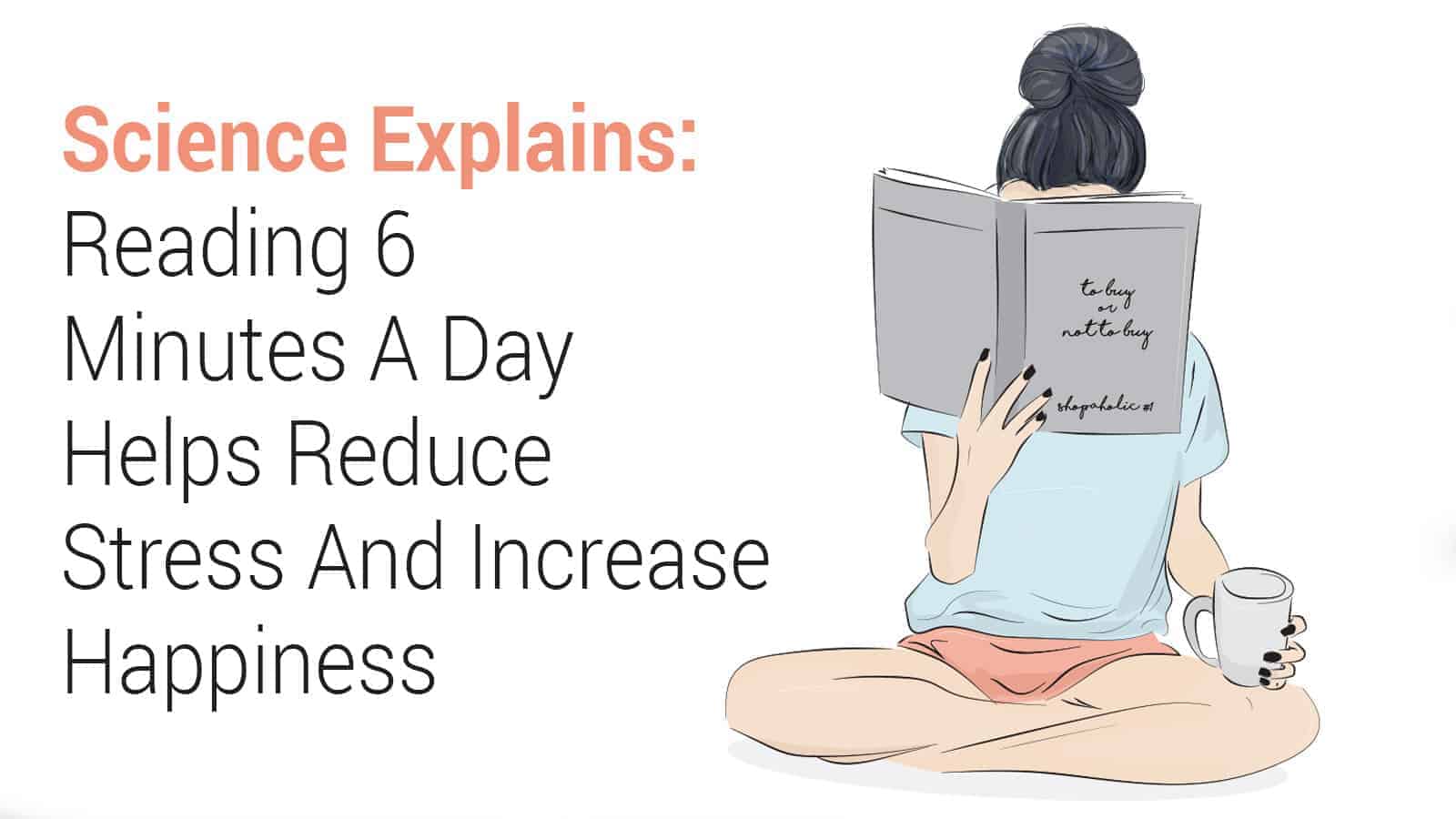It’s safe to say that most of us have pretty busy schedules. However, we could probably all find time for reading at least six minutes daily. Perhaps at the end of the day, when you’ve completed all our work and can finally get cozy in bed, you can read for a few minutes before dozing off.
Reading offers so many cognitive and physiological benefits. But according to Pew Research, about a quarter of Americans haven’t read a book in the past year. At least the majority of us have opened a book (even if we’ve only read a few pages!)
You’ll find so many topics and genres to choose from. Indeed, you could probably read your whole life and still have thousands or even millions of books left to discover. No matter your interest, you can find plenty of traditional books or E-books about the topic. With a quick Google search, you can find books to choose from, whether you like self-help, fantasy, romance, books about finance, or something else.
“Reading is essential for those who seek to rise above the ordinary.” – Jim Rohn
Below, we will go over how reading can improve your health, not to mention give you more wisdom. Who doesn’t want to increase their knowledge and understand our complex world a little bit better?!
Study on how reading reduces stress
In fact, most people feel overwhelmed and stressed most of the time. Our stress comes from work, family, responsibilities, relationships, and the fast pace of life. We don’t give ourselves nearly enough leisure time anymore. That rapid pace may explain the sharp increases in mental illness today. With so many stimuli to sift through, how can we know what we need to pay attention to and what we can ignore?
However, we can find ways to turn everything off for a while and relax our minds. Perhaps we should look no further than our bookshelves to find ways to reduce our stress and increase happiness. According to a study by the University of Sussex, reading just six minutes daily can reduce life’s pressures by 68 percent. This can help people have more mental clarity and reduce stress build-up in the body.
The Mindlab Study
Researchers from Mindlab International at the University of Sussex analyzed participants’ cortisol levels and heart rates before observing how they responded to different tasks. Reading books lowered their stress levels more than participants’ other activities.
This included listening to music (61 percent), having a cup of tea or coffee (54 percent), and taking a walk (42 percent). They also found that playing video games lowered stress levels by 21 percent but increased heart rate.
“Losing yourself in a book is the ultimate relaxation,” Dr. David Lewis, researcher and cognitive neuropsychologist, said. “It really doesn’t matter what book you read, by losing yourself in a thoroughly engrossing book, you can escape from the worries and stresses of the everyday world and spend a while exploring the domain of the author’s imagination.”
“This is more than merely a distraction,” he added, “but an active engaging of the imagination as the words on the printed page stimulate your creativity and cause you to enter what is essentially an altered state of consciousness.”
Of course, it all depends on what you choose to read. If you mostly read the news, you will likely feel even more stressed or depressed due to the harmful content. However, if you read about light-hearted, positive topics such as how to start a garden or how the planets affect our moods, you will notice a decrease in stress.
Seven other health benefits of reading:
Why else should you pick up a book and read? Here are some other considerations
1 – Reading improves brain health.
Did you know that books can rewire your brain? Researchers have found that when you read books, your mind gives off specific signals to move along a complex network of circuits. As you improve, the systems and circuits strengthen and become more complex.
In a 2013 study, researchers studied how reading a novel would affect the brain using MRI scans. Over 9 days, participants read the story “Pompeii.” As readers reached the novel’s climax, more areas of their brains lit up as the circuitry improved. Researchers found that as participants read the book, their brain connectivity improved for a few days afterward. Especially in the part of the brain that responds to physical sensations such as movement and pain, the somatosensory cortex, scientists saw an increase in electrical activity.
2 – Increases empathy
Studies have shown that people who read more literary fiction, which involves the lives of different made-up characters, have an increased ability to relate to the feelings of others. This can help people build and maintain social relationships. Of course, reading one fiction novel probably won’t increase empathetic abilities much, but research shows that people who read many fiction books have heightened empathy.
3 – Expands vocabulary
Researchers have found that students who begin reading at a young age typically have large vocabularies by the time they become adults. Vocabulary size can actually impact many aspects of your life, from scores on standardized tests to college acceptance and job placements. Many companies want to hire people with “soft” skills, including the ability to communicate effectively. Reading books can help you do this by expanding your vocabulary. You can carry over these phrases into your real-world conversations as well.
4 – Helps prevent age-related cognitive decline
The National Institute on Aging recommends reading books to keep your mind active as you get older. Studies have actually shown that elderly people who keep their minds engaged by reading or solving math problems every day can improve or maintain their brain health. However, no studies have shown definitively that reading can prevent Alzheimer’s or dementia.
If you’ve been keeping your mind active your whole life, this further improves your cognitive ability. A 2013 study by Rush University Medical Center found that people who have stimulated their minds their entire lives had much less chance of developing dementia.
5 – Helps you sleep better
Instead of being on your smartphone before bed, why not pick up an old dusty book? Smartphones and other lights from screens can disrupt your sleep because of the blue lights, but reading can help you prepare for sleep. Make sure you choose something relaxing instead of topics that might increase cortisol, such as action books or the news.
6 – Decreases depressive symptoms
Many people suffer from depression today, but reading can temporarily help take your mind off rumination and shift your focus to a different activity. Reading allows you to escape into your world, away from all the dramas and problems of this one. You can quickly get wrapped up in the story with the characters and take a bit of a break from your real-life story.
Plus, some books can give you techniques and tips on reducing depression. Self-help books have a lot of good advice on how to improve your mental health. Plus, they also improve your life overall. You might also consider spiritual texts, as these typically talk about mindfulness and meditation, which might decrease depression.
7 – Reading may increase life span
A health and retirement study followed 3,635 adult participants over 12 years. They found that people who read books regularly lived 2 years longer on average than those who didn’t read or read primarily magazines and other media types. Researchers also found that the participants who read more than 3.5 hours per week had a 23 percent higher chance of living longer than those who didn’t read at all.
Along with reading books, you can do other things to decrease your stress and increase happiness as well.
Three other lifestyle tips to reduce stress
- Eat a clean, balanced diet. Try to avoid processed foods as much as possible and stick to a whole-food, plant-based diet. What you eat impacts every function in your body, and eating clean helps everything run more efficiently.
- Exercise more often. Our bodies were designed to move. And working out has been proven to alleviate anxiety and stress, perhaps more than any other activity.
- Get enough sleep. Studies have shown that many people have chronic insomnia, which can impact other areas of health. Set the alarm for the same time each day, and only go to sleep when you feel exhausted.
Final thoughts on how reading can reduce stress and boost happiness
You may not think reading books can change your life that much. However, the studies cited show that this small activity can significantly affect our health. Reading can do more than reduce stress and make us happier. Indeed, it can also give us life-changing advice depending on the books we read. Who knows how different the world might look if we spend more time reading than we do on our phones or social media?



















